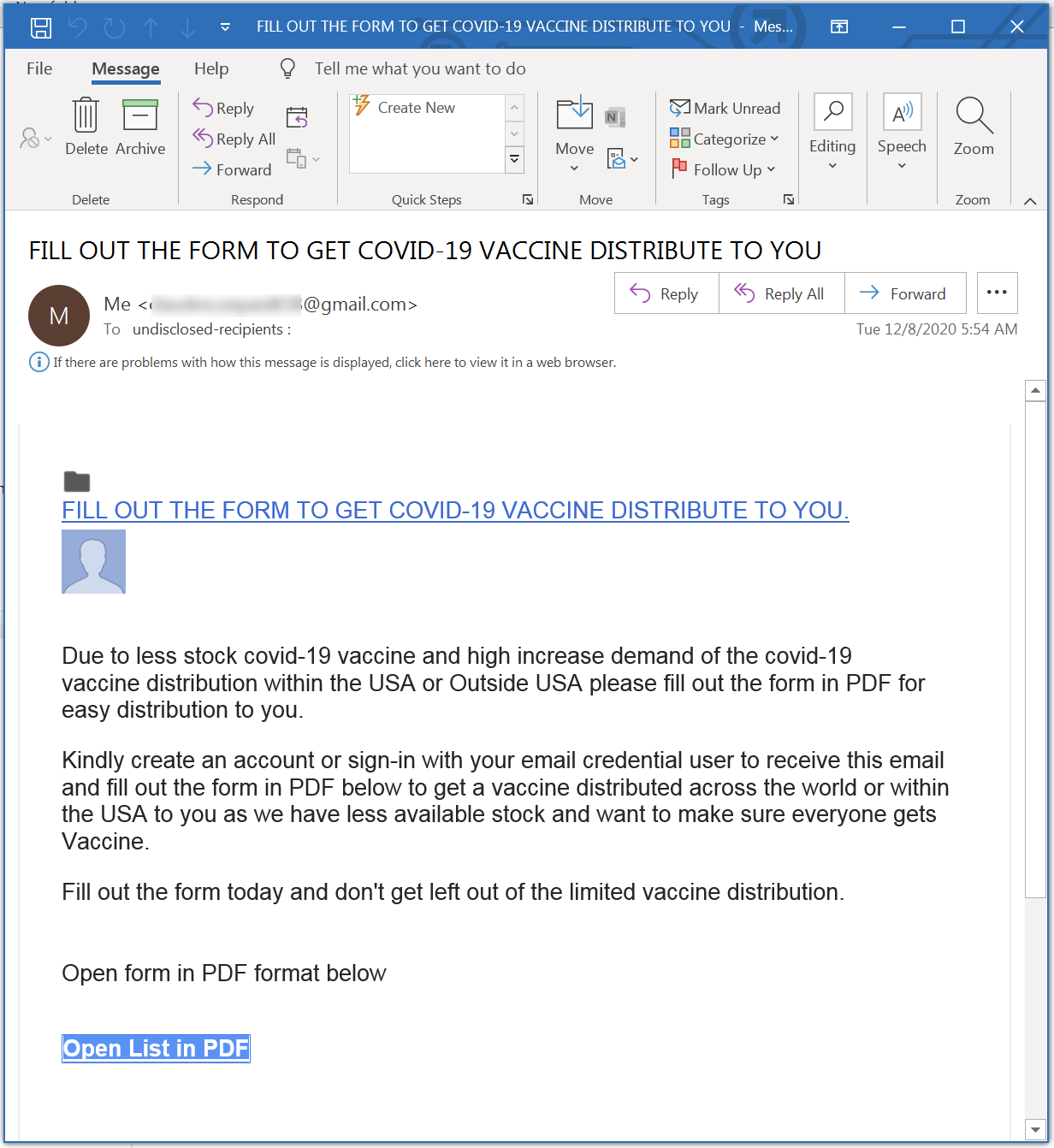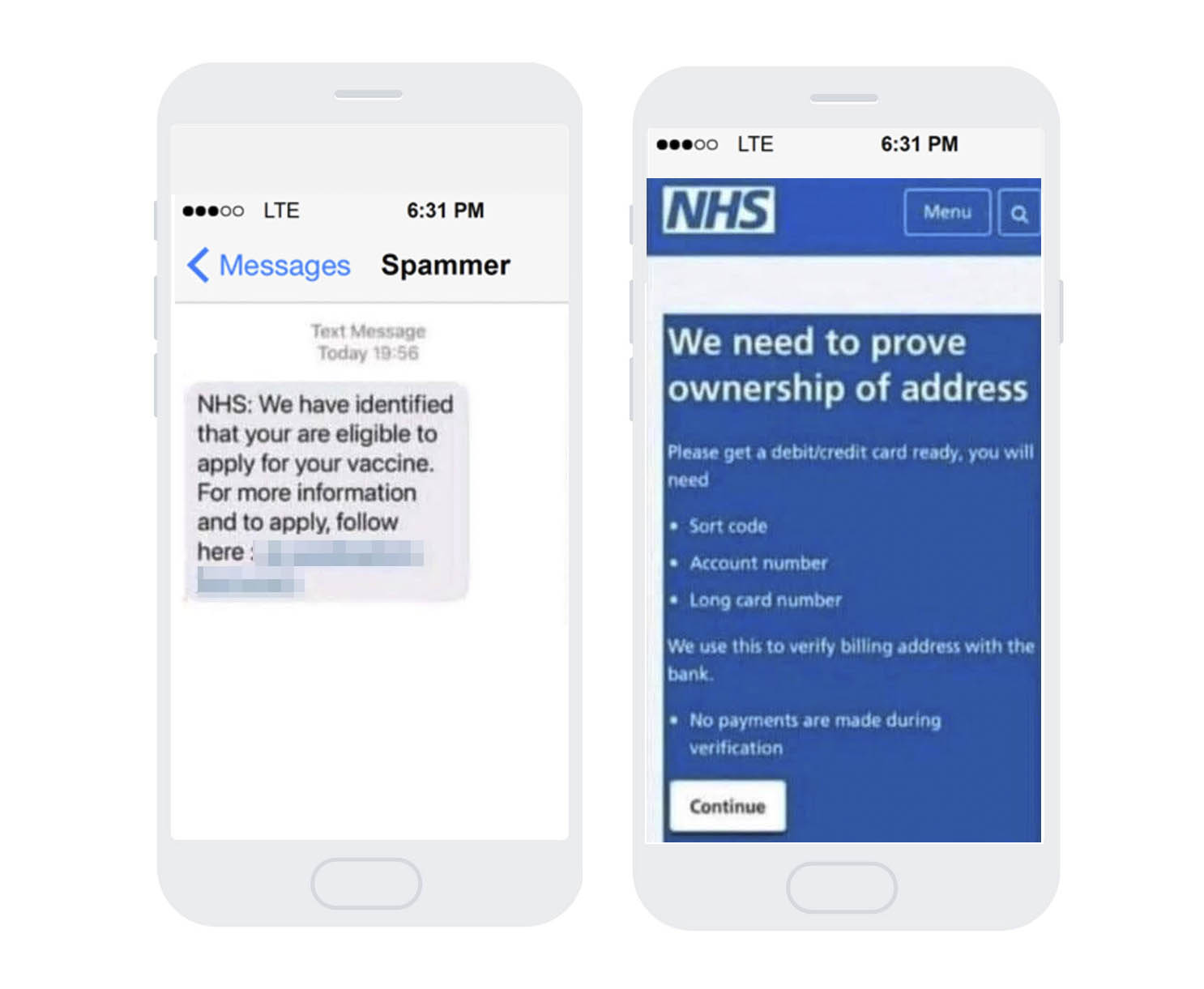
Scam Alert: Watch Out for COVID-19 Vaccine Scams
February 11, 2021
 By Tim Russell
By Tim Russell
Tech Services ManagerSince the COVID-19 pandemic began, people all over the world have anxiously awaited the development of a vaccine that could protect them from the coronavirus.
Now that the vaccines are available in the U.S. pipeline, you can bet scammers won't be far behind. That's why we're warning people of potential fraud related to the COVID-19 vaccine rollout.
How to Avoid a COVID Vaccine Scam
Scammers will promise early access to the vaccine through phishing emails, text messages and bot phone calls — all in exchange for a payment or your personal information. Don't fall for it!
The Federal Trade Commission (FTC) has released these COVID vaccine tips to remember:
- You likely will not need to pay anything out of pocket to get the vaccine during this public health emergency.
- You can't pay to put your name on a list to get the vaccine.
- You can't pay to get early access to the vaccine.
- No one from a vaccine distribution site or private insurance company will call you asking for your personal or Bank account information to get you to sign up.
- Beware of providers offering other products, treatments or medicines to prevent the virus.
- Always consult with a licensed medical professional to obtain a COVID-19 vaccine or treatment.
Never pay for a promise of vaccine access or share your personal information. Instead, hang up or delete the message, and report it to the FTC at ReportFraud.ftc.gov.
Example of a COVID Vaccine Scam Email:

Source: KnowBe4
There are several telltale signs that an email is a phishing scam. It could contain several misspelled words or grammatical errors. The name on the email may not match the email address. If you hover over the links, the URL may not point to a credible website. Check the email carefully and do not click any link or download any attachment until you are 100 percent sure it is legitimate.
Example of a COVID Vaccine Scam Text Message:

Source: BBC
Never click on a suspicious link in an unsolicited text message from a strange number, because it could lead you to malware or a phishing site.
Example of a COVID Vaccine Scam Phone Call:
Police and law enforcement agencies around the U.S. are warning that anyone calling you about a COIVD-19 vaccine is just trying to scam you. For more information, read our article on how to block spam phone calls.
Have you received a suspicious COVID vaccine message?
Here are some more tips to avoid becoming a victim of a COVID vaccine scam:
Don’t panic. Cybercriminals may use scare tactics and a false sense of urgency to get you to click or tap a link before you’ve had a chance to investigate it. For example, if you receive a message that informs you to "Act Now" or there may not be enough vaccines for everyone, ignore it.
Be suspicious. Like with all messages, it’s important not to immediately believe anything that sounds too good to be true. If you are unsure of whether the offer is legitimate, search for it online, checking credible sources.
Go straight to the source. If you receive an email or message that appears to come from the federal government or local health authority, and you are unsure if it is real, do not click on a link or call a number they give you. Instead, navigate to the official website on your own, through your web browser, and contact the organization directly to confirm its legitimacy.
Check with your doctor. If you want a vaccine early, reach out to your healthcare provider about your options. If you don't have a primary care physician, check out the official website of your local health department for more information.
[For more information, see our other article on how to avoid coronavirus scams in general.]
Where to find real COVID vaccine information
The first limited doses of COVID-19 vaccines in the U.S. are being given to health care workers and residents of long-term care facilities.
For everyone else, your state and local governments will make the final decision on who gets the vaccine and when. For more information on how the vaccine will be distributed — and when it will be available to you — visit your state's Department of Public health website.
Was this article helpful?
We want to provide solutions that matter, when you need them most. Get the latest fraud and security updates by subscribing to our free newsletter. And if you have any further questions, contact us today.